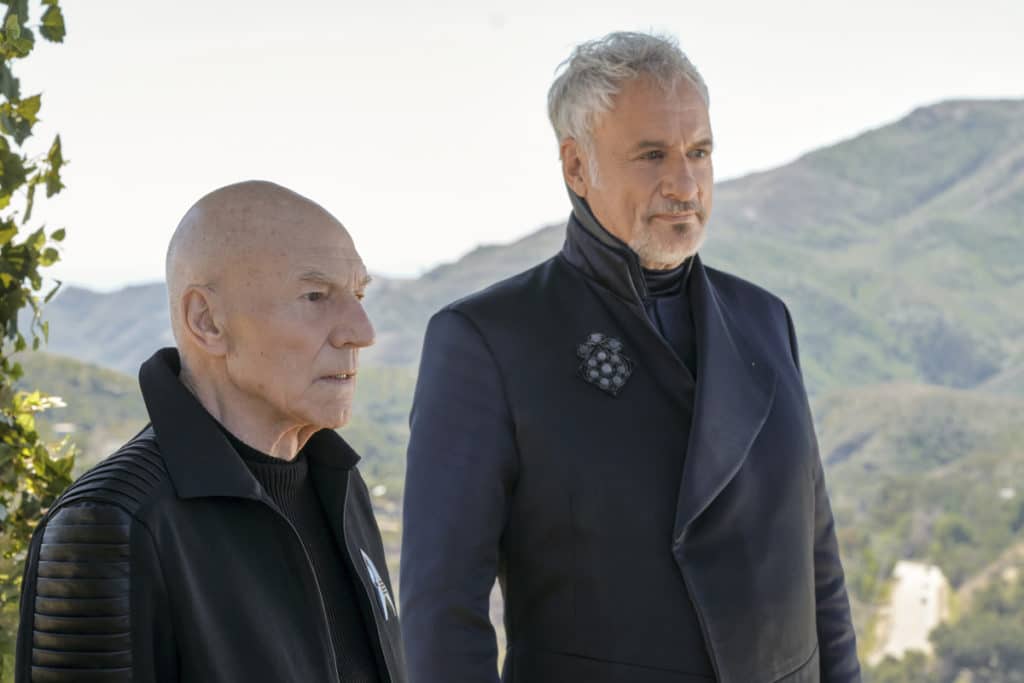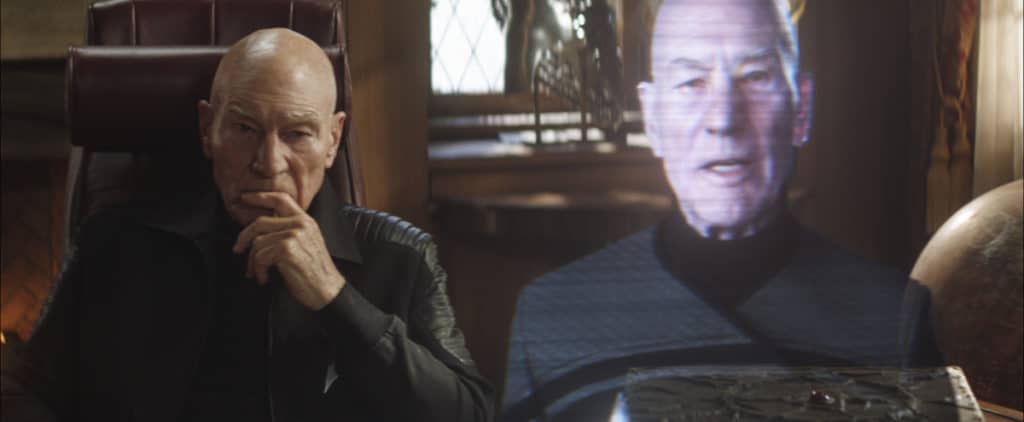Read also:
How to Watch FX Live Without CableHow To Watch AMC Without CableHow to Watch ABC Without CableHow to Watch Paramount Network Without CableA jaunt to a grim alternate timeline misses the point of Mirror Universe-style tales.
Star Trek: The Next Generation never did a Mirror Universe episode, though it sidled up to the idea now and again. This was particularly true of “Yesterday’s Enterprise,” the closest TNG ever got to a darker, more war-like vision of Starfleet. In hindsight, the restraint is impressive. With the franchise’s trademark optimistic ethos, you can’t blame shows like Deep Space Nine, Enterprise, and Discovery for chasing the thrill of what the Federation might look like if the gloves came off.
“Penance” doesn’t give viewers Jean-Luc Picard (Patrick Stewart) in the Mirror Universe, but it comes damn close. A characteristically cryptic Q deposits Picard into an alternate timeline where some mysterious choice in the past irrevocably shifted humanity’s future. The result is the preternaturally noble man inhabiting the life of one General Picard, a decorated officer in the Con-federation. In contrast to the good ole’ UFP, the Confederation is a xenophobic, authoritarian regime that conquers and subjugates other races with viciousness to match the Mirror Universe’s Terran Empire.
There’s still a minor thrill to seeing Picard in such an unusual posture. Hearing references to (and seeing the skulls of) significant figures like Gul Dukat, Martok, Sarek, and even one General Sisko adds to the alternate universe oomph of the piece. And hearing a speech from the alternate Picard himself — which sounds closer to the bigoted rhetoric of Colonel Green or John Frederick Paxton than of the high-minded explorer we know and love — illustrates how far this oppressive order is from the familiar City upon an Interstellar Hill.
Everyone we know in Picard remains good and pure, and none of them have to make any truly difficult moral choices.
But that minor thrill is where the impact of Jean-Luc’s alternate timeline jaunt ends. The thrust of a good Mirror-verse story is examining the distance between the people we know and the baddies they might have become under different circumstances. Witnessing the antics of a goateed Spock or an insecure Archer or even one “Captain Killy” has force because of the common ground and distinctions between the heroes we know and the villains we meet.
But in “Penance”, the gang’s all here in Evil-ville and no worse for wear. Picard, Seven (Jeri Ryan), Rios (Santiago Cabrera), Elnor (Evan Evagora), Raffi (Michelle Hurd), and Dr. Jurati (Alison Pill) have all been snapped over by Q with their benevolent attitudes intact. While there’s a little forensic analysis to be done on the lives their dastardly counterparts lived before their arrival, there’s never any character stakes for two simple reasons: Everyone we know in Picard remains good and pure, and none of them have to make any truly difficult moral choices.
They do, however, need to acclimate to their new environment and locate one other. It’s entertaining to watch Seven and Agnes take two different but equally valid approaches to discern whether any of this is real, and there’s an air of mystery as to who made the jump and what their new fiendish roles might be. But the whole effort feels perfunctory given how quickly everyone reunites and how easily they adjust and improvise.
The adventure isn’t without its fun character moments. “Penance” is a coming-out party for Dr. Jurati. Her virtual cat (Patton Oswalt), her colorful descriptions of Confederation technology, and her hastily cobbled-together cover story of how she and “President Seven Shots” were college drinking buddies are all a hoot. Pill continues to bring verve and effervescence to part, and a little more of her in the spotlight is always welcome.

Of course, this is a grand return for Q as well. More than any other legacy performer in Star Trek: Picard, de Lancie feels as though he hasn’t missed a beat since the last time taunted a stuffy Starfleet captain. (what’s a few decades to a demigod?) His bon mots, teasing hints, and general condescension toward Jean-Luc capture the same unique energy the actor possessed in his last appearance.
And yet, something feels off — not with the performances but with the writing. Yes, Star Trek: Picard is deliberately darker than TNG, but it’s still off-putting to hear Jean-Luc swear at his omnipotent tormentor or see Q slap his mortal counterpart so hard he draws blood. Some of that’s surely by design. Picard diagnoses Q as “not well”, to explain away these aberrations and hint at some deeper purpose. The normally playful sprite seeming so grave and severe is a conspicuous sign that this is Serious Business™. But while the last thing Star Trek needs is for “Penance” to rest on its laurels and give viewers a reheated Picard/Q clash, the departures go too far in the opposite direction.
Still, as usual, Q provides “mon capitaine” with a challenge of sorts, forcing him to atone for some unmentioned but terrible past misdeed. (Presumably involving the domestic abuse shown in flashes last week.) That means living in this grim alternate timeline and trying to figure out where things went wrong.
Enter the Borg Queen (Annie Wersching). No, seriously. She’s being kept on proverbial ice by the Confederation for a public execution on this univere’s ballyhooed “Eradication Day.” Some convenient exposition from Seven reveals that Borg Queens have a trans-temporal, multidimensional awareness, so the Queen is not only aware that this timeline is wrong but can pinpoint the exact time and place of the divergence.
Queenie is basically a talking magic solution machine here. She’s not only able to identify the source of the problem, but provide the time-travel calculations necessary to let our heroes pull a Temporal Whale Rescue Maneuver and slingshot around the sun to travel back to the Los Angeles of 2024. Her status as a malign force who’d kill the good guys if she had the chance adds a wrinkle, but the chatty Borg box is mainly a convenient solution to a contrived problem.
Some contrivance might be forgivable if spending time in the world of the Confederation were only more thought-provoking or, heaven forbid, entertaining. All of Star Trek’s “realm of badness” episodes are, by their very nature, a little silly. But true to the standard universal moniker, they exist to hold a dark mirror up to the familiar and help the audience consider what the distorted reflection says about us and them.

This grim timeline, though, is facile and shallow. The Confederation is a caricature of all things brutal, prejudiced, and militaristic. The Earth it occupies is conspicuously polluted and riddled with alien oppression. Its leaders are one-dimensionally callous and cruel. The whole thing amounts to a flat, uncomplicated evil, without any intrigue or nuance, and thus no real impact.
In fairness, fans shouldn’t envy the writers here. The authoritarian power grasps of the contemporary ultra-Right are so vicious and so absurd that trying to reflect true events subtly in fiction is a fool’s errand. But there’s just nothing interesting about this alternate timeline.
Charitably, General Picard utilizing Romulan slave labor and employing synthetic lifeforms as servants carries some grim resonance given the themes of last season and beyond. For the most part, though, this is just a generic Bad Guy Land our heroes need to escape from. After fifty years of Mirror Universe stories, you need more than “It’s characters you know, only now they’re in Villain Town!” to create a compelling setting or worthwhile dose of social commentary.
Darkness for darkness’s sake is boring.
It would help if the season’s second episode provided the “why” of this world. Therein lies the glaring flaw of mystery box storytelling writ large. “Penance” can only tease the answer to that question because it needs the lure of the reveal to string the audience along for further adventures. The experience feels hollow because the show can’t engage with the root of any of this yet.
Instead, Picard and company must find someone who can magically divine how to discover What Went Wrong™. They must also race against time to pull off their temporal shenanigans despite the absence of any real urgency here. (After all, pretty much every Starfleet crew has traveled through time without the help of a Borg Queen.)
Thus, the Confederation timeline feels strangely empty, lacking noteworthy villainous characters for our heroes to play off of or any immediate crisis to solve. Yes, there’s a fleeting jolt to seeing “President Annika Hansen” and a concomitant horror to hearing Picard give the interstellar equivalent of an “America First” speech. But for now, at least, there’s nothing below the surface.
Darkness for darkness’s sake is boring. Minimal peril for maximum drama is disappointing. Alternate universes without the chance to interrogate key differences are nothing but window dressing. The best Mirror Universe outings succeed by showing us radically different versions of characters we know in a setting that illuminates how far we could fall amid such shadows. “Penance” merely gives its audience the same unchanged characters in a surface-level dystopia.